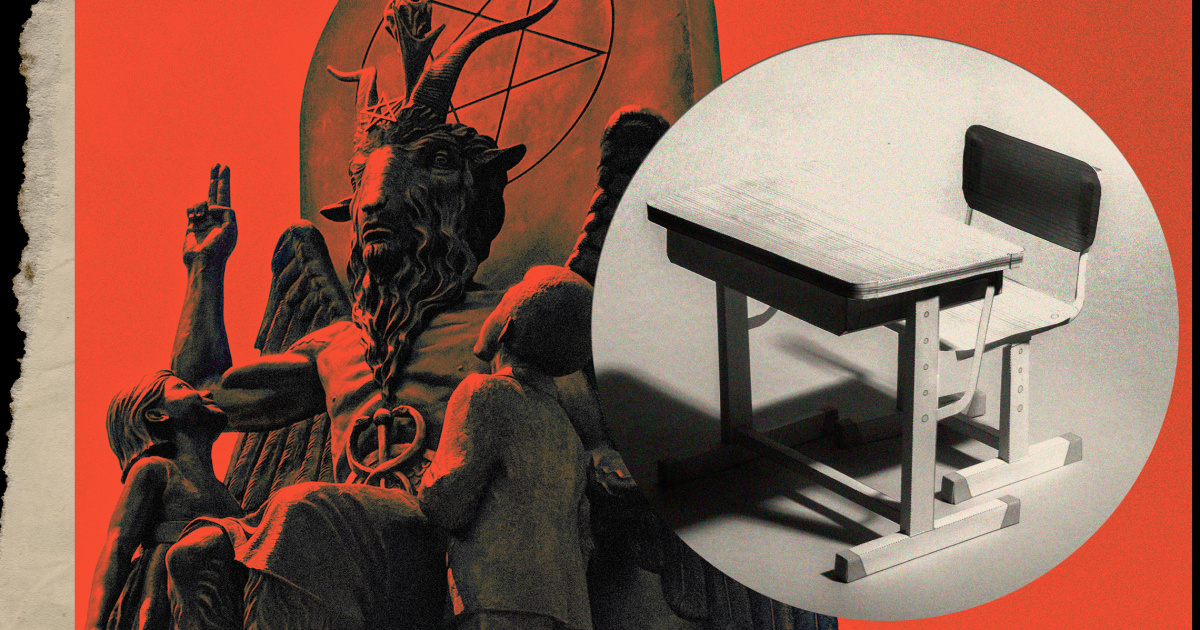The Temple believes in reason, empathy, and the pursuit of knowledge, its website FAQ helpfully explains. And it doesn’t worship Satan. “Satan is a symbol of the Eternal Rebel in opposition to arbitrary authority,” it states.But it’s not just a joke, supporters say. And opponents seem to agree.
One man was charged in January with a hate crime for vandalizing the temple’s altar at the Iowa State Capitol. Another was arrested and accused of throwing a pipe bomb at the group’s headquarters in Salem, Massachusetts, leaving a note that urged the group to “REPENT” and “TURN FROM SIN.” And a third was arrested this month and accused of plotting to blow up the headquarters.
“It definitely started with a kind of humorous or satirical element to it, but this is a movement with hundreds of people that’s been going for 10 years now — they’re quite serious about it,” said Joseph Laycock, a religious studies professor at Texas State University who wrote a book-length study about the group. “They’re willing to put up with death threats. They’re willing to wear bulletproof vests because Neo-Nazis have threatened to kill them if they give a public speech. People don’t normally take those kinds of risks for a joke.”
Interest in joining the Satanic Temple shot up in recent years, Greaves said, and the number of congregations more than doubled since 2021. That coincides with a decrease in the number of self-identified Christians in the U.S. and a growing movement among right-wing activists to insert conservative Christian doctrines into public policy and schools.
“The real fear of Christian nationalism is driving people into the arms of groups like the Satanic Temple,” Laycock said. “And then the fact that there are now Satanists taking to the streets of America is causing the Christian nationalists to double down, too, and making them even more determined to cling to power for as long as they can.”
The laws in Florida and Texas require school boards to vote on whether to appoint chaplains in their districts. Similar bills have been proposed in 13 other states this year. The proposals, which vary slightly, would have chaplains of various denominations serve in similar capacities as school counselors, in some cases with on-campus offices or salaries paid for by the districts.
“They are able to help the child work through their issues, work through their feelings, and also encourage them to work with their parents, in accordance with their family’s underlying religious foundations,” said Brad Dacus, president of Pacific Justice Institute, a conservative advocacy group that testified in favor of the Texas bill.
Proponents of chaplains in schools have gone on the offensive, vowing that the Satanic Temple won’t infiltrate their schools. “There will be no Satanists in Oklahoma Schools. Period,” Ryan Walters, the state’s right-wing superintendent of public instruction, recently tweeted. Florida Gov. Ron DeSantis declared at a bill signing for the new law last month that the Temple wouldn’t qualify to provide chaplains. “That is not a religion,” he said.
But legal experts warn that conservatives disregard the Satanic Temple at their own peril, because the group’s strategy of stepping into spaces intended for other religions is often effective. In 2016, the Temple began running After School Satan Clubs, seeking to start them in schools that already had Christian-based groups on campus. A federal court sided with the Temple in a legal challenge last year, and there are currently seven clubs nationwide, where children make arts and crafts, learn about animals and do science experiments.
“The Constitution is unambiguous about this,” Greaves said. “You just cannot take a religious identity and cut it out from a public accommodation. It’s against the law, the school districts will lose, they’ll have to pay the attorneys fees, and frankly, they shouldn’t be pulling their budget into this culture war grandstanding B.S.”










:quality(85):upscale()/2024/07/09/853/n/1922153/da45a392668d8f62ec5f73.52985633_.jpg)
:quality(85):upscale()/2020/05/29/674/n/1922195/e75d744c5ed125fc6c5a57.40615745_.jpg)



